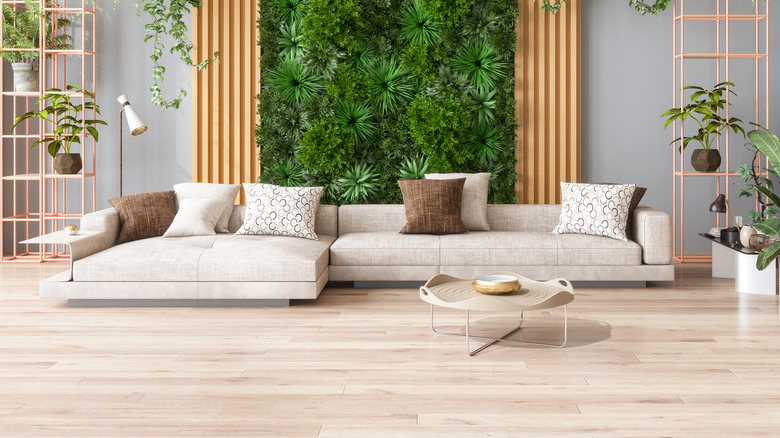What Is A Pickled Wood Floor (And How To Do It Yourself)
When you hear the world pickled, your mind probably doesn't jump to a wooden floor. However, pickled wood floor is very much a thing, and you can achieve the look yourself if you're feeling confident in your DIY skills. Typically, the term refers to washing out the darker hues in the wood for a bleached look. The style first became a thing back in the 19th century, when the process involved lots of extra steps. Nowadays, pickling wood is a lot simpler and in fact, can be done with just a stain.
Stylistically, a pickled floor is ideal for keeping the rustic aesthetic of wood while brightening up a room. It also doesn't feature as much of a modern appearance as a pre-bleached wood floor, not to mention that it's an ideal way to update an existing floor look if you've moved into a new place and don't want to make major changes. Here's what you need to know so you can try the technique for yourself.
Premade or DIY a pickling stain
To achieve a pickled floor, you'll need a pickling stain, a clean cloth, a paintbrush, and a clear sealant. First, prep and clean your wooden floor. You might also want to sand it lightly so the surface is completely smooth and to help the stain adhere. Apply the stain with a brush for precision, making sure you're going in the same direction the whole time for an even look. When it comes to letting the stain dry, each brand will dry differently, so always check the instructions. Once it's fully dry, wipe down your newly-pickled floor with a clean cloth before going over it with the sealant.
If you can't find a pickling stain, vinegar also works. For this method, reach for steel wool and white vinegar in addition to a brush and a sealant. Add a good amount of the vinegar to a container and put in an equal amount of steel wool. When the steel wool has dissolved, the solution is ready to use. Grab your brush and paint the floor with the vinegar mixture until it's all covered. Finally, use the sealant to protect and preserve your hard work. No matter which pickling method you pick, always patch test before you go all in just in case something doesn't look right, especially if you're working with old flooring.
